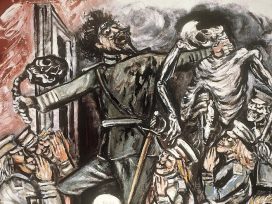The myth of sudden death
Although it makes for a great dramatic effect, the theories of the sudden death of democracy disregard the gradual erosion and capture of institutions, and the role of the populace – argues political scientist John Keane.
Earlier this year, John Keane started off a discussion on the death of democracies in Eurozine’s focal point ‘The writing on the wall’. Since then, the pace of a democracy breakdown have been discussed by several authors. Together with editor-in-chief Réka Kinga Papp, Keane discusses his article ‘How democracies die, fast and slow’ and the lack of biospheric representation as a democratic death threat.
Read John Keane’s articles in Eurozine, including the debate on the death of democracies discussed in the episode :
Bloodless democracy?
A response to John Keane
People power?
A reply to James Miller
Anthropocentrism and democracy in planetary times
A response to John Keane
How democracies transform, fast and slow
A response to John Keane
This episode is an edited version of a longer conversation, which is available in its entirety only to our Patrons. You can get access to the full episode, and more giveaways by becoming a Patron for as little as €5 a month on Patreon.
Please subscribe to Gagarin on Spotify, Apple podcasts, Castbox, Stitcher, Soundcloud or wherever you get your podcasts, and leave a review so more people can find us. You can also subscribe to our newsletter, so you’ll always know what’s truly worth thinking about.
Published 26 May 2023
Original in English
First published by Eurozine
© Eurozine
PDF/PRINTIn collaboration with
In focal points
- Living dead democracy
- Why Parliaments?
- Spelling out a law for nature
- No more turning a blind eye
- The end of Tunisia’s spring?
- Protecting nature, empowering people
- Albania: Obstructed democracy
- Romania: Propaganda into votes
- The myth of sudden death
- Hungary: From housing justice to municipal opposition
Newsletter
Subscribe to know what’s worth thinking about.
Related Articles

While lasting peace between the Turkish state and the Kurds now seems a genuine possibility, Ankara’s assault on democracy continues. Sırrı Süreyya Önder, the longtime dissident who died last year, remains a symbol of hope.

Liberty on the line
Index on Censorship 2/2025
Free speech in the US: how book bans are targeting independent thought; why Trump’s assault on education imitates Erdoğan’s; what the closure of Radio Free Asia means for the region’s information space; and how American liberals can learn from Soviet dissidents.











